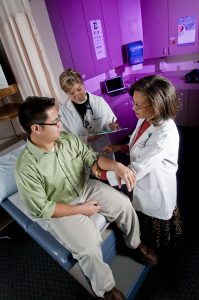Nursing Program Ranked #7 in New York State

SUNY Poly has been ranked number seven among “The 10 Best Colleges for Nursing Majors in New York” by Zippia.com. This ranking puts SUNY Poly in the company of such institutions as NYU (#19), Stony Brook University (#2), and Binghamton University (#1).
According to Zippia, a platform that aims to help users find the career that is right for them, the rankings were tabulated based on data from the National Center for Education Statistics, as well as College Scorecard data from ED.gov, including career results, percentage of graduating class that are nursing majors, selective admissions rates, cost of attendance, graduation rate, and median amount of debt.
“As our College of Nursing continues to grow, we are thrilled to have garnered so much attention for the quality and value that we can provide to our students,” said Dr. Kathleen Rourke, Interim Dean of the College of Nursing. “Being ranked among the top institutions for nursing in New York State is a great testament to the hard work of our faculty, staff, and students in creating, delivering, and applying a hands-on, top-tier curriculum that creates the very best healthcare workers in the industry.”
SUNY Poly’s academic offerings in nursing include: R.N. to Bachelor of Science in Nursing, 1+2+1 AAS/BS program in collaboration with St. Elizabeth College of Nursing, and Master of Science degrees in Family Nurse Practitioner, Nursing Administration and Nursing Education. The SUNY Poly College of Nursing also offers advanced certificates in family nurse practitioner and nursing education. SUNY Poly’s undergraduate and graduate nursing programs are registered by the New York State Education Department and credited by the Commission on Collegiate Nursing.
According to the United States Department of Labor’s Bureau of Labor Statistics, there were more than 2.9 million registered nursing jobs in the U.S. in 2016, offering a median pay of $68,450 a year. Registered nurses work in hospitals, physicians’ offices, home healthcare services, and nursing care facilities, providing and coordinating patient care along with advice and emotional support to patients and their family members, while educating patients and the public about various health conditions.
The profession, according to the Bureau, is projected to grow 15 percent from 2016-2026, much faster than the average of other professions.
Recent Comments
Archives
- September 2018
- August 2018
- May 2018
- April 2018
- March 2018
- February 2018
- January 2018
- December 2017
- November 2017
- October 2017
- September 2017
- May 2017
- April 2017
- March 2017
- February 2017
- January 2017
- December 2016
- November 2016
- October 2016
- September 2016
- August 2016
- May 2016
- April 2016
- March 2016
- February 2016
- January 2016
- December 2015
- November 2015
- October 2015
- September 2015
- August 2015
- May 2015
- April 2015
- March 2015
- February 2015
- January 2015
- December 2014
- November 2014
- October 2014
- September 2014
- August 2014
- May 2014
- April 2014
- March 2014
- February 2014
- January 2014
- December 2013
- November 2013
- October 2013
- September 2013
- August 2013
- June 2013
- May 2013
- April 2013
- March 2013
- February 2013
- January 2013
- December 2012
- November 2012

